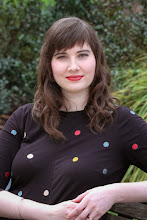About Me

- Rachel E. Watson
- I think, read and write. I might review books, mull on music, spin original poems, share insights or tell stories, but you can be sure whatever you read here comes from a thoughtful and considered place within.
Popular Posts
-
Anne Shirley and Gilbert Blythe. For women of my generation, before we were old enough to even know ourselves, there was the love st...
-
Social Media Blues By Rachel Watson I’ve got a deadline. A project due in less than a week. I open my blan...
-
This is the sheet music to Rachmaninoff's "Vespers, Op. 37." This post is about a beautiful kind of classical music I re...
Blog Archive
-
▼
2014
(57)
-
▼
October
(13)
- Truest Beauty from the Finest Artist of All
- The Music of 1914, from Blues to Ragtime
- What's Your Point of View? Lessons from Novel-Reading
- Discovering the Joy of Painting and the Art of Let...
- A Song for When You Are Wrong
- I'm Gonna Buy Myself ... er ... Fix Myself Some Ne...
- Vespers: The Beautiful Evening Prayer
- The Perfect Song for Winter
- Fighting the Lie That Beauty Is All I've Got
- "Gone Girl" Review: Does This Film Say Anything Ab...
- The Perfect Song for an Introvert
- Five Things I've Learned from Anne with an "e"
- ArtPrize 2014: You're Disturbing, You're Delicate
-
▼
October
(13)










